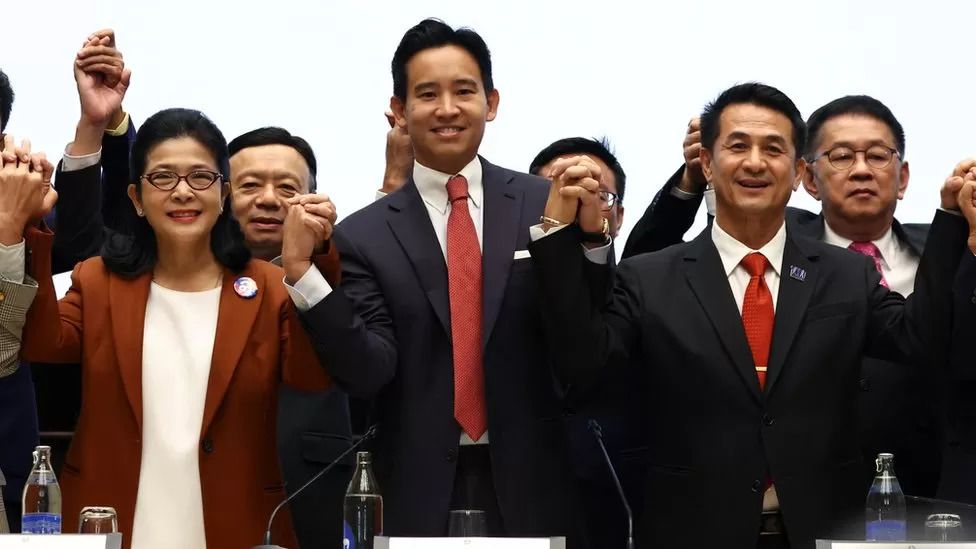The leader of the reformist party that won Thailand's election says he is confident he will be able to form a coalition government.
 Mr Pita unveiled his coalition of seven parties on Thursday but still needs more support to form government
Mr Pita unveiled his coalition of seven parties on Thursday but still needs more support to form government
Pita Limjaroenrat says his Move Forward party has secured an alliance with seven other parties that give them at 313 of the 376 votes needed.
More than 36% of Thais voted for Move Forward in a rejection of the military-backed rule of the past nine years.
But the party is not guaranteed government due to parliament's set-up.
Thailand's parliament consists of 500 elected seats in the lower house and 250 unelected positions in the Senate appointed by the military.
There are fears the military-appointed Senate could block the new administration, however Pita this week has presented his party's path to government as a democratic inevitability, to counter conservative opposition from the Senate.
"We've got the momentum behind us," he said on Thursday, standing next to party leaders in his alliance at a joint press conference.
Following its election success on Sunday, Move Forward reached out immediately to the second most popular party, Pheu Thai, to establish the basis of a viable coalition.
Move Forward won 152 of the 500 seats in the lower house, while Pheu Thai won 141.
Following several party negotiations, Move Forward's leader said on Thursday they had reached an agreement on broad policy issues, that would form the basis of a new government administration.
He added: "The 313 votes we have in the lower house are sufficient in a normal democratic system, and we do not need to seek any more partners."
The dramatic surge in support for Move Forward, and the clear majority won by the two main opposition leaders, has being widely interpreted as the Thai public's rejection of the military-backed rule since the 2014 coup.
The 250-member Senate was created and entirely appointed by the then-military government and allowed to vote on the selection of a new prime minister - a role rejected by many Thai parties as incompatible with democracy.
Move Forward and its supporters have argued that if the Senate were to use that power, it would not only go against the expressed will of the people at the ballot box, but would represent the last gasp of an authoritarian system that has been spurned by the voters.
A few senators have said this week they will support a Move Forward-led coalition. Mr Pita's alliance has been hopeful there will be enough of the others to get them over the threshold of the super-majority of 376 votes needed to form government.
But other senators have refused to back them because of the party's policy to reform the lese majeste royal defamation law.
Mr Pita's party had struck a chord with Thailand's young voters by promising reforms to those laws which severely punish those found guilty of criticising the royal family.
But the third largest party, Bhumjaithai, which won 70 seats at the polls, has stated it will not support Move Forward because of those planned reforms.
Bhumjaithai has been seen as a potential kingmaker in any new government. However Move Forward has said it has not invited Bhumjaithai to join its coalition, and argued its coalition already has a clear majority in the lower house.
Move Forward has worked this week to leverage the weight of public sentiment on its side, following an election that ignited voter passion and hope.
Others have warned that if the military authorities were to revert to the old playbook of extra-parliamentary intervention, that could risk provoking an angry public backlash.















